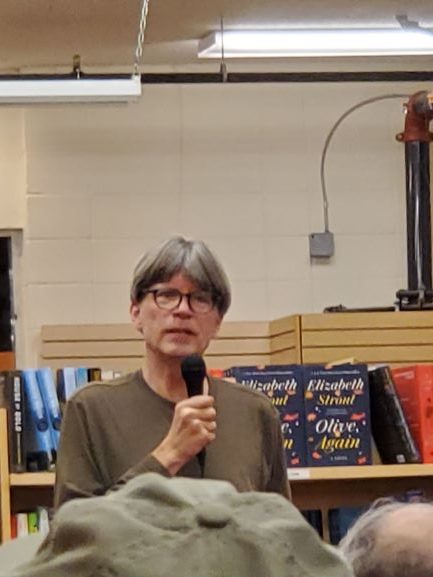Richard Powers, Pulitzer Prize wining author of The Overstory, spoke at Petaluma Copperfield’s, in conversation with Cheryl, the store’s book buyer.
I can throw around the usual words about Powers, like, genius. I think I’ll let his own words do most of the speaking. Powers is deeply thoughtful and deeply intellectual. He takes his work seriously, and doesn’t hide behind flippancy, self-deprecation or false modesty when he talks about his work or what he is trying to do with his work. (He is wryly humorous about himself in other ways –he doesn’t take himself too seriously.)
The Overstory is about people and trees; mostly about trees, and in particular, for a long stretch, about an event that happened in Northern California and Oregon called the Timber Wars. It was a real thing. Powers wanted to center the nonhuman (in this case trees) in the book. It meant, he said, telling the story using a different shape than the conventional western novel shape, with rising action leading to a climax and a denouement or wrap-up. The shape of The Overstory is very much the shape of a tree.
Powers’s work has been described by others as a blend of “the realist impulse…” combined with “the poet’s license to invent with unleashed abandon.” Powers talked about the “tension between realism and lyricism… or realism and allegory. Allegory has fallen so far out of favor that it’s almost embarrassing to admit to.”
While, outside, a busker played a mournful tune on a flute, Powers talked about expectations of readers opening The Overstory. They expect a novel, he said, but they seem to get a series of short stories, each about a person “whose life has been taken over by a tree.” “I wanted to push the whole locus of the story outside of ourselves.”
Then he said, “You know you’re not in the Kansas of Realism anymore.”

Powers’s moment of awakening came when he was teaching at Stanford, the heart of the Silicon Empire, and, he said, attending dinner-parties where people said, “We can fix every defect in nature, if you’ll just hang in there with us.” Seeking refuge from the dystopian, commodified present, Powers visited the Santa Cruz mountains, frequently walking in the redwoods, “in part to escape the oppressive future by entering the long past.”
Looking at an old-growth tree, Powers realized that, “Like any story about a colonial enterprise, the folks who did the heavy lifting weren’t in the story.”
He started working on The Overstory to acknowledge “his debt to the nonhuman.”
“We know how to tell stories about inner conflicts,” Powers said, and gave an example. “We know the political/social novels. We’ve forgotten how to tell… when we humans want something and the living world has another idea.”
He thinks these stories fell out of the Western canon about 200 years ago, and he said he thinks it’s “because we thought we’d solved that problem,” echoing the tech-person’s comment at the Stanford dinner party. Human exceptionalism is the root (pun intended) of most of our problems, such as the current climate crisis.
He talked about revising The Overstory five times before he realized the shape of the book would not be conventional.

Cheryl had a series of thoughtful questions prepared, but she almost didn’t need them, since in a couple of places Powers had anticipated the question. These two were very at ease with each other, and it’s clear that Cheryl had done her research, and communicated with him before the event. The planning showed because it didn’t show, if that makes sense; this interview was smooth and genuine.
Powers drew a large crowd and I was happy to see that.
If you haven’t read The Overstory, give it a try. Think of it this way; the opening, with its various characters, are the roots, the coming-together is the trunk of the story, and then, when characters seem to disperse, think of branches, cones and seedpods. It’s a brilliant book. And I’m delighted to have gotten to see him in person. (Thanks to Brandy for suggesting this!)
